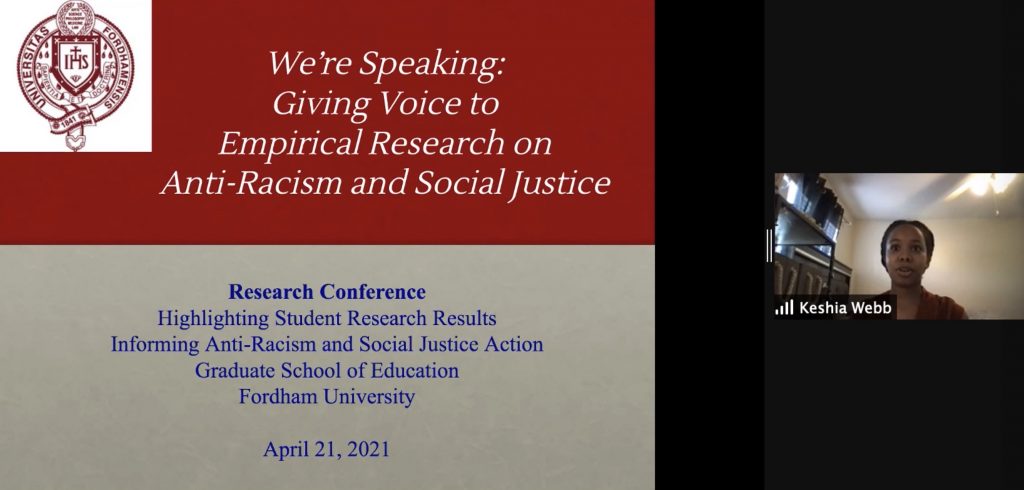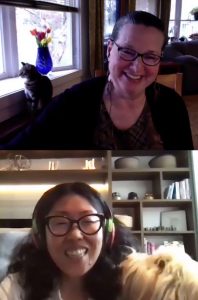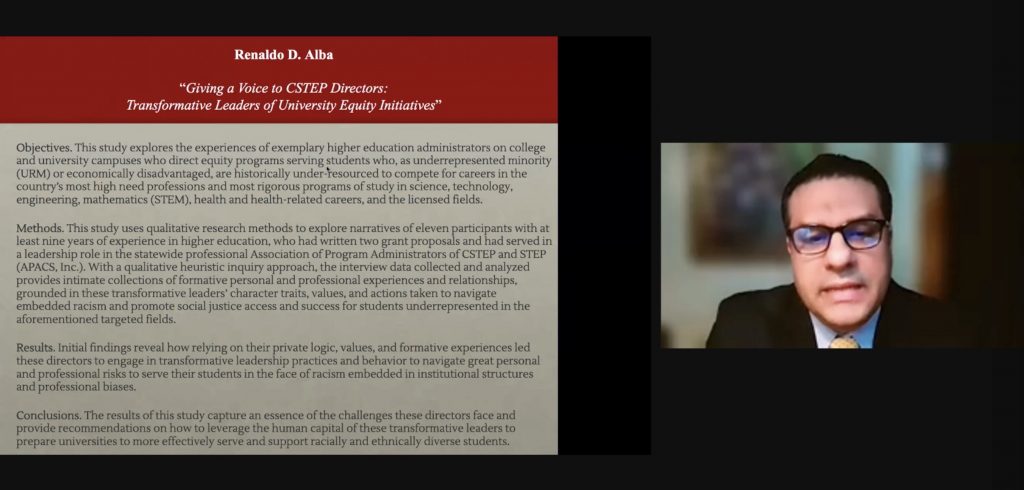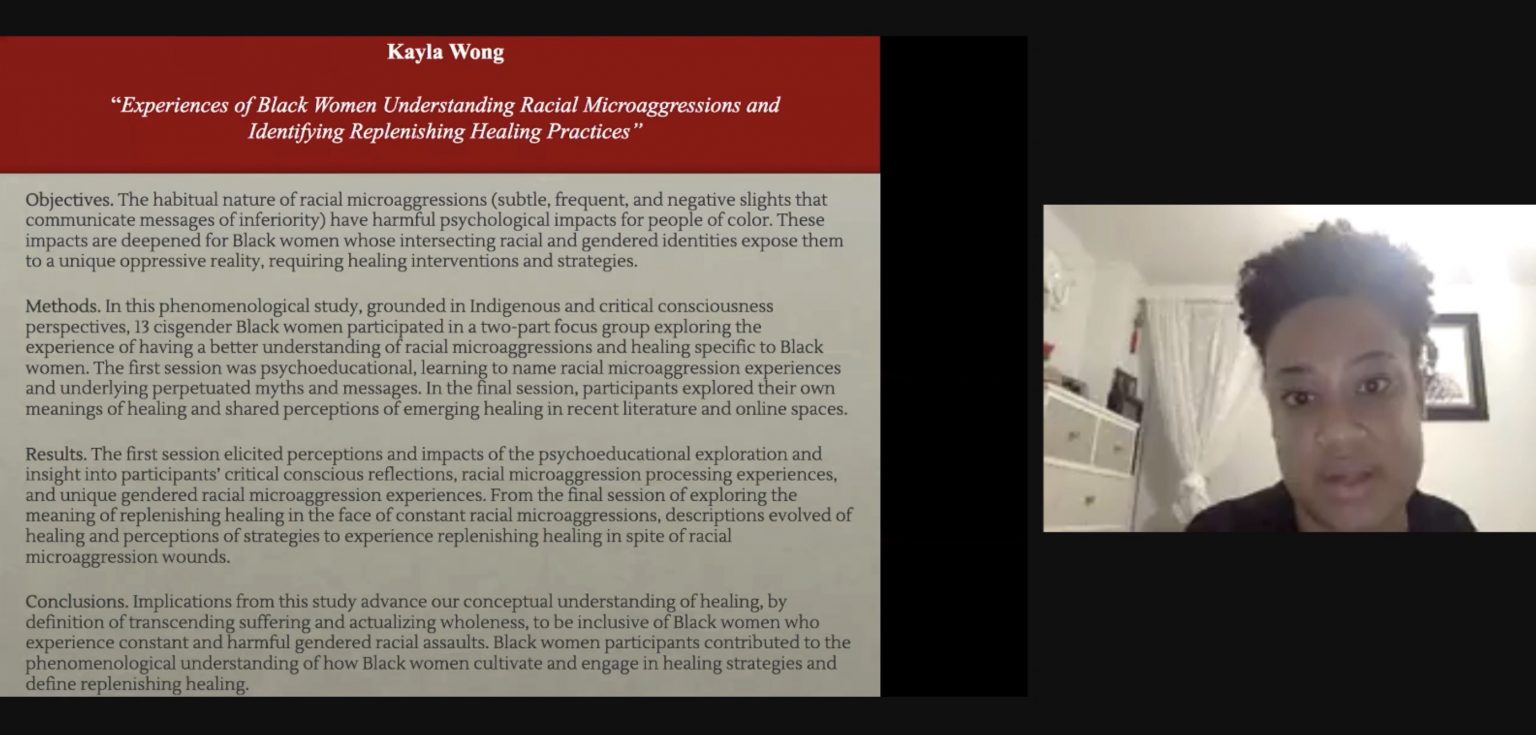After a historic year centered on racial justice, students from the Graduate School of Education spearheaded the virtual research conference “We’re Speaking: Giving Voice to Empirical Research on Anti-Racism and Social Justice” on April 21, where they presented their research findings and amplified the voices of their peers, especially students from the BIPOC (Black, Indigenous, people of color) community.
“We thought that it was really important to present research from students’ perspectives, especially given everything that has been going on since the pandemic and more recently, with George Floyd, the Black Lives Matter movement, and the anti-Asian violence,” said Keshia Webb, a GSE doctoral student in counseling psychology and conference co-chair, who organized the conference with GSE student Nathaniel Pickering and faculty mentor Margo Jackson, Ph.D.
The three-hour conference came at a timely moment, said Rafael A. Zapata, chief diversity officer, special assistant to the president for diversity, and associate vice president for academic affairs, in his welcoming remarks.
“The work you’re doing has certainly been highlighted by the events of just yesterday—the verdict in the Derek Chauvin trial,” said Zapata, whose office co-sponsored the conference. “Our close look at systemic inequalities and racism needs to continue to be focused on.”

‘I Needed More Than Coping’
Twelve students presented their research to more than 100 virtual audience members. Their research topics focused on pandemic-related issues, including racial discrimination against male Asian international college students and the transition to STEM online learning platforms for urban high school students. They also researched issues that existed long before the pandemic, including the racial identity of multiracial Latinx adults and the sexist culture that can develop among young male athletes.
GSE student Kayla Wong explored how Black women understand their experiences with racial microaggressions and how they have found ways to heal from their trauma—a topic that hits home for Wong, a Black woman.
“A lot of research on racism is often focused on exploring how we can educate white people about racism and also on how people of color cope with racial microaggressions, but personally, it didn’t feel like enough,” said Wong. “I think that we need to do more than coping. And I know, personally, I needed more than coping.”
Sara Skluzacek investigated what happens when school staff attempt to reduce their implicit bias through “individuation,” or replacing stereotypes with personal characteristics, and “creating contact,” or directly interacting with people from different racial groups. She found that participants became more aware of their biases, but they had trouble facing them.
“I’m still finding my role in this work as a researcher, as a white woman, as a teacher in a racist system, as a mother of a biracial Black boy, and simply as a human who believes in equity and justice,” said Skluzacek, a doctoral student in the contemporary learning and interdisciplinary research program.

How Research Can Shape Law Enforcement Training
Anna Cait Wade examined how public charter school teachers perceive their role in interrupting the school-to-prison pipeline for girls of color. She found that cultural differences, especially a lack of understanding of the “complexities of race, trauma, and poverty in the classroom,” can result in poor discipline practices and strained relationships with Black female students, but sustained professional development for teachers could help.
Audience member Lori Wolff, Ph.D., a professor in the Graduate School of Education, asked Wade how her study could inform law enforcement programming and training. Wade, a doctoral student in the school psychology program, said that general research consistently shows that it’s not effective for students, especially Black girls, to have a police officer inside schools.
“The highly trained teachers or mental health professionals are the ones who understand the intersectionality that their students are experiencing and the unique challenges in their life, and actually having [police officers]there can escalate things quite a bit,” Wade said. “What would be better is to highlight some of the experts in the schools and their practices for sustaining relationships with students, and having that trust so that when a hot moment comes, you’re able to reach [them].”
‘We Shouldn’t Be Learning at the Cost of Clients of Color’
In the Q&A, audience member Juan Carlos Matos, assistant vice president for student affairs for diversity and inclusion, asked student presenters what topics they would like to see in their University coursework to better prepare them as educators.

Stephanie L. Gutkin said her study participants told her they wanted trained professionals to guide them through the process of broaching race and racism with their clients in the classroom before working with clients.
“It’s been stated that the first experiences that these [counseling and school psychology]students are having are in practicum sites with clients of color, which is exceptionally harmful as a learning experience, and we shouldn’t be learning at the cost of clients of color,” said Gutkin, who presented her project “Are White Counselor-Trainees Stuck in Theory?: Navigating Race and Racism in Therapy.”
Each student presenter was awarded $200 in research funding from the Graduate School of Education. They were the first of their peers to present their work in a student-led conference at GSE, said Akane Zusho, Ph.D., interim dean of the Graduate School of Education.
“We really need more events like this—events that showcase the thoughtful, authentic, and rigorous work that our students are doing here at GSE around issues of justice and anti-racism,” Zusho said. “This past year, I really have come to appreciate even more how much better we all are when we center the voices of students.”



